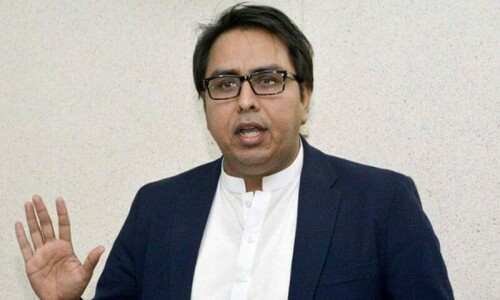LAHORE: A serious lack of trust dominated the recent meeting of the Pakistan India Joint Business Forum (PIJBF) in Lahore as Pakistani delegates complained that their Indian counterparts did not share any meaningful information.
More than 50 delegates from Pakistan and India discussed a wide range of trade-related issues in the form of taskforces on sectors like agriculture, automotive, energy and SMEs while concluding with a list of recommendations identifying areas of potential cooperation.
However, majority of Pakistani delegates were of the opinion that like the previous two rounds of negotiations, they got a clear message: “India is ready to accord access to its markets through manufacturing at its soil and not through trade.
“In spite of repeated requests, the Indians kept on explaining customs and excise duties that too without cascade and not tariff,” delegates representing Pakistan’s agriculture, auto and engineering besides SME sectors in the negotiations told Dawn.
There had been progress in the power sector with India offering to sell electricity to Pakistan and both sides discussing tariffs and modalities for transmission. The energy taskforce emphasised the importance of business-to-business collaboration and government support, specifically in renewable energy projects. The two governments were advised to move forward in facilitating cross-border sale of power.
A delegate, who had been part of all rounds of the negotiations, said that trade balance had been in favour of Pakistan till 1965.
“India granted most favoured nation (MFN) status to Pakistan in 1996 after structuring its trade laws to protect its industry. And it became meaningless for Pakistan. The level of subsidies available to Indian industry was not shared with us. India has an abundance of cheap raw materials which are not on the ‘negative list’ for Pakistan. Our industry can become competitive if we get access to this cheap source but we don't get rates on competitive prices if even they get quoted at all,” said the delegate.
The joint taskforce on agriculture proposed a bilateral agriculture trade agreement to create better trade links identifying mutually beneficial ground for cross-border trade. It also recommended urgent opening-up of the Wagah-Attari border for items like farm machinery, equipment and agricultural-inputs.
Opening up Pakistani agriculture market to highly subsidised Indian sector would do more harm than good.
“It is a matter of national food security. Any agricultural product entering Pakistan should be subjected to levies to offset the effect of subsidies available to Indian producers. The Indians have yet to provide details of levies available to their producers.
“India convinced the World Trade Organisation (WTO) to continue provision of subsidies to its agriculture sector. And we lamely agreed to withdraw all subsidies to our agriculture sector. Can our agriculture benefit under such circumstances?” says the delegate.
The automotive taskforce proposed that trade in the sector should be initially boosted at component level while encouraging cooperation between the two countries in terms of technical and skills development support.
Pakistani delegates, representing the sector, pointed out “true technical barriers to trade” with India.
“Not only Pakistan but the whole world is crying ‘foul’ against India over its standards for auto and engineering sector. The Indians did not share information about homologation process. For example, if we state that emission should be 100 mg/km, it means nothing unless we know how it is going to be measured. Indians insist that Euro and Bharat standards are same but practically it is not so. Bharat emission standards are unique. Not only the emission requirements are different but they are even measured differently. Resultantly, our tractors, cars and motorcycles are being denied access to Indian markets on the basis of these standards,” says the delegate.
The SME taskforce recommended that more items of small medium enterprises be added to Pakistan’s ‘Wagah-Attari Allowed List’, as well as creating warehousing facilities, simplifying documentation and custom procedures, along with creating a robust finance infrastructure framework for SMEs to facilitate smoother transactions.
The meeting stressed the need to liberalise the existing visa regime, removing entry-exit and city-specific restrictions on a priority basis by the two governments.
Other key recommendations included opening up of more land routes; ensuring that the Integrated Check Post (ICP) at the Wagah-Attari border was operational on both sides and facilitating phone communication.
The delegates also emphasised the need for a dispute resolution mechanism and proposed the immediate implementation of the Redress of Trade Grievances Agreement, ratified by both countries in September 2012.













































Dear visitor, the comments section is undergoing an overhaul and will return soon.